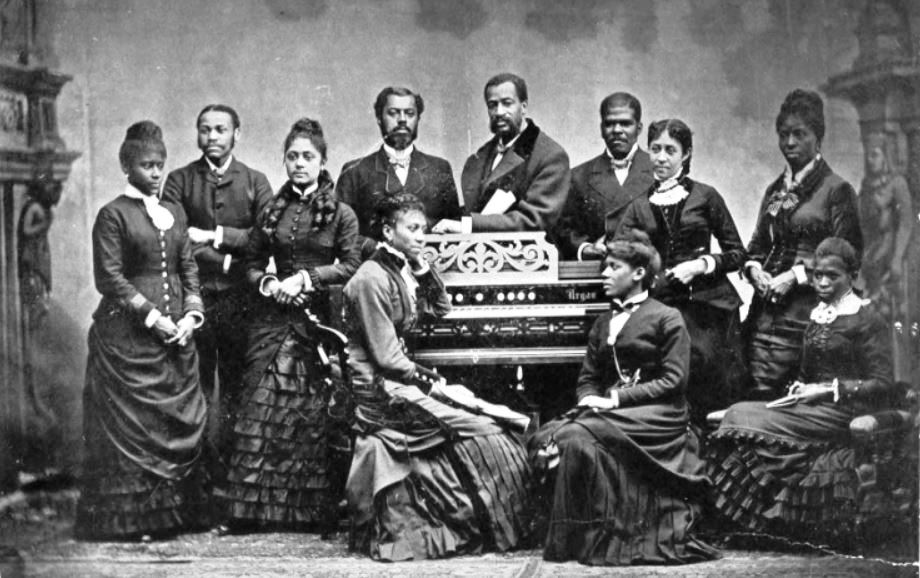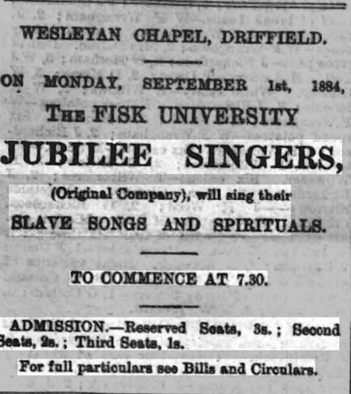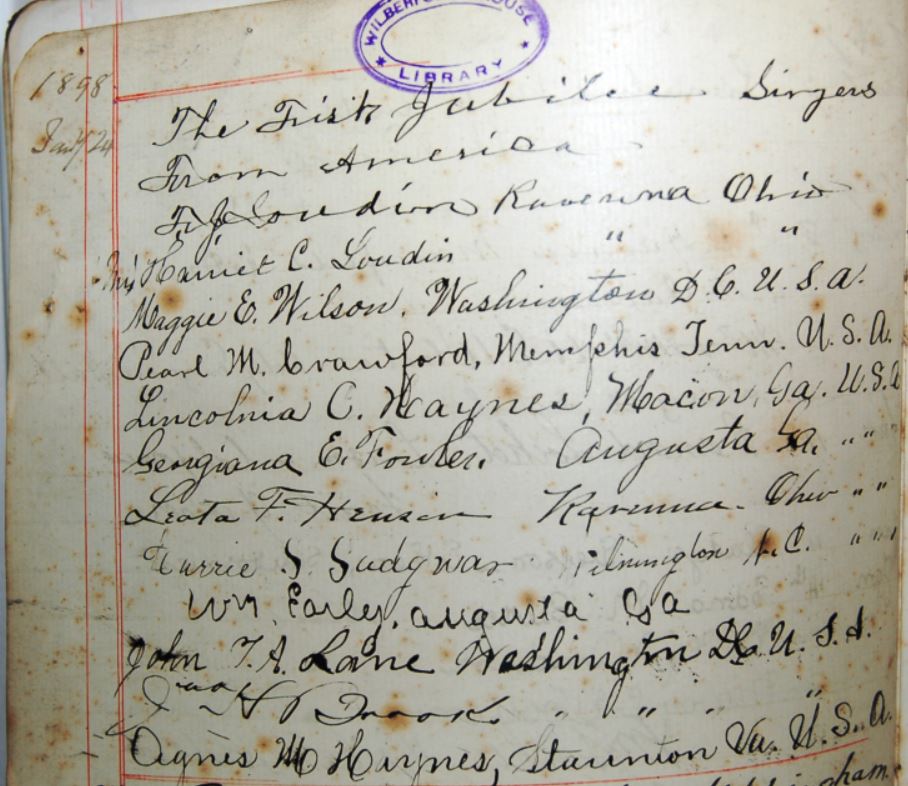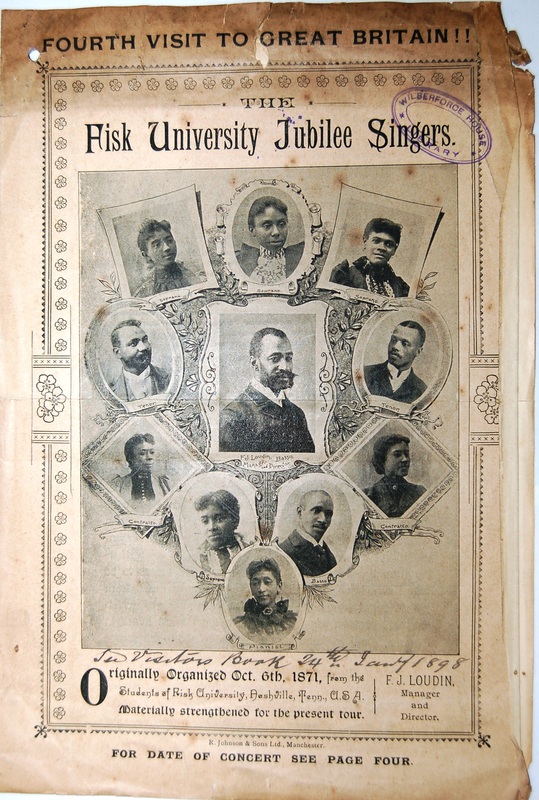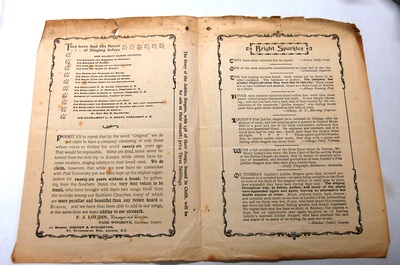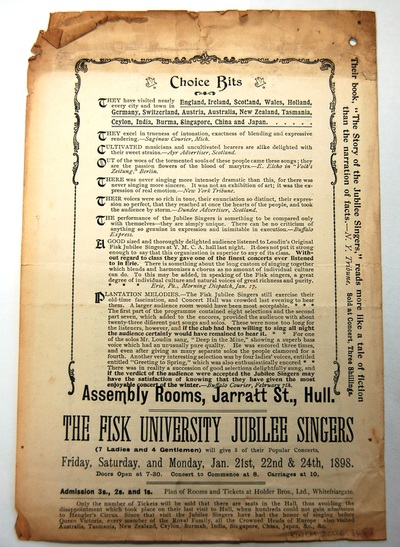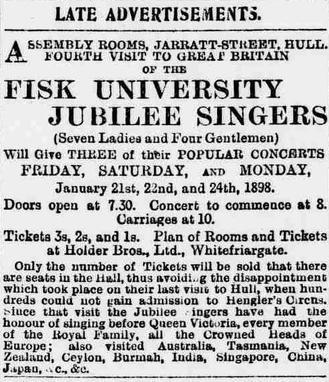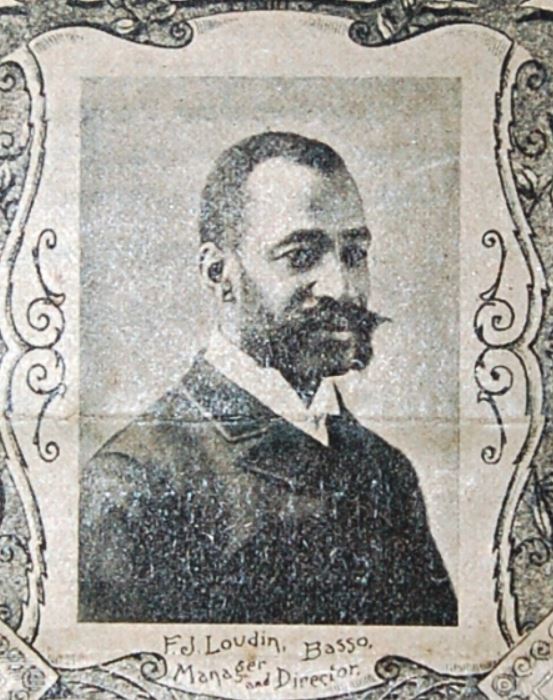"But the world listened only half credulously until the Fisk Jubilee Singers sang the slave songs so deeply into the world’s heart that it can never wholly forget them again.." W. E. B. Du Bois (1903)
|
"Troubles of the Jubilee Singers:" A Letter from Hull - 1874
The singers had successfully raised £10,000 for the building of the new Jubilee Hall at Fisk University. However, despite their amazing successes in Britain, the punishing concert schedule had paid a heavy toll on the troupe - and what with disagreements with director George White and others, sickness and issues concerning money, the singers attempted to stay in Europe. In June 1874 the Hull Packet recorded the apparent 'troubles' of the Jubilee Singers.[1] The newspaper reported “some discord” amongst the singers which had become apparent from a letter sent to the Nashville Banner from “one of their old friends” in Tennessee. A letter written to this friend from Hull on 19 April 1874 (only nine days after the singers ‘farewell concert’ at Hengler’s Circus in Hull) from an unidentified member records that the regular engagement of the singers was supposed to have finished on 31 March. Any concerts in the month of April were supposed to have been set aside as “a special benefit” for each singer, but the letter records that they were a “complete failure” financially because “little effort” was put into publicising these concerts by the management once the Jubilee Hall fund had been raised.[2] The letter went on to suggest that the singers would be leaving Europe “penniless” and that despite objections and threats from director George White, half of the troupe were prepared to remain there and raise money for themselves. As Sandra Graham suggests in her article on the singers’ contracts, the rebellion did not in the end happen. Maggie Porter and Jennie Jackson were called home by their families and Isaac Dickerson left the troupe, returned to Britain and became a student at the University of Edinburgh.[3] This quarrel between the singers and George White was unsurprisingly not mentioned in the official publications about the singers’ tours authored by Rev. Pike and J.B.T. Marsh.[4] The Following Years
After a return to Nashville for respite the singers embarked on a second tour of Europe a year later in May 1875. The troupe consisted of new contralto singer America W. Robinson as well as Ella Sheppard, Julia Jackson, Mabel Lewis, Georgia Gordon, Jennie Jackson and Maggie Porter. Of the men only Thomas Rutling remained. He was joined by tenor Hinton Alexander and bass singers Benjamin W. Thomas and Frederick J. Loudin who would later replace George White as leader of his own group of singers. Over the following four years the group had many changes with singers arriving and leaving. However, despite many concerts in Yorkshire during the years between 1876 and 1878 - when they finally disbanded (see list of concert dates right), the troupe do not appear to have returned to Hull, at least in this format and during this tour.
Other 'Jubilee Singers'
One exception to this is the appearance in the city and the local area of other groups of 'Jubilee Singers', some from America and Canada, and some home-grown. In August 1878 the Hull Packet reported the visit of Jarratt and Palmer’s “troupe of American artistes” whose ‘Jubilee Singers’ performed alongside American minstrel groups (white entertainers who appeared in so-called ‘blackface’ and appropriated the popular racial stereotype of the Black slave for their performances).[5] The Mail described a circus-like evening of entertainment at the Aquarium and Princess’s Theatres with “freed slaves, banjo players… and a host of talent to tickle the fancy of the most ardent lovers of sensation.” To modern sensibilities this kind of ‘entertainment’ is difficult to comprehend with its obvious racist content; but American ‘minstrel’ shows of this kind were very popular with British audiences, and remarkably were still being broadcast on British television right up until the late 1970s. |
Fisk Jubilee Singers: Male Quartet Earliest Recordings c.1909-1911
Jubilee Singers' Later Performances in Yorkshire Second British Tour: 1876 3 Jan: Private Concert, Victoria Hall, Leeds 7 Jan: Town Hall, Leeds Jan: The Armoury, Huddersfield Jan: St George’s Hall, Bradford Jan: Corn Exchange, Doncaster 13 Jan: Festival Concert Room, York 14 Jan: Zion Chapel, Batley 18 Jan: Victoria Hall, Leeds 19 Jan: Corn Exchange, Wakefield 20 Jan: The Albert Hall, Sheffield 18 Sept: Scarborough 19 Sept: Congress Hall, Whitby 1877 8-9 January: Victoria Hall, Leeds 10 January: Exchange Rooms, Goole 11 - 12 January: Festival Concert Hall, York 12 January: Harrogate 2 February: Wakefield 5 February: Albert Hall, Sheffield 7 February: Congregational Church, Barnsley 8 February: Rotherham 9 February: Selby July: Malton 18 July: Congress Hall, Whitby Sept: Festival Concert Room, York ------------------------------------------------------ 1878 [not original troupe] 31 Aug: Aquarium Theatre (morning), Princess’s Theatre (evening), Hull. With Jarratt and Palmer’s troupe of American Artistes Nov: Theatre Royal, Hull. [with Jarrett & Palmer’s Great American Company] |
Three months later, in November 1878, the Hull Packet were advertising the same show, this time being performed at Hull’s Theatre Royal.[6] Despite the advert’s suggestion that the ‘famous Jubilee Singers’ would appear during this evening, they were almost certainly not the singers from Fisk University who had disbanded four months earlier. Indeed, in the wake of the success of the original Jubilee Singers many other troupes were formed who copied the singers’ format and singing style and performed in various venues around the country.
Frederick Loudin's Jubilee Singers in Hull and East Yorkshire
As suggested, after their four year tour of Europe, the original Jubilee Singers troupe led by George White was disbanded in July 1878. White went on to form a private troupe the following year and when he retired in 1882, bass singer Frederick Loudin stepped in to form his own touring group, retaining the name 'Fisk University Jubilee Singers' although this incarnation was a private enterprise and never had any association with the university.[7] The group began with former Jubilee Singers Maggie Porter, Georgia Gordon, Jenny Jackson, Minnie Tate, and Maggie Carnes, and started a tour of Britain in 1884.[8]
|
Frederick Loudin's Jubilee Singers in the East Riding
1884/85 1 Sept 1884: Wesleyan Chapel, Driffield. 1 Sept 1885: Assembly Rooms, Beverley 4-5 Sept1885: Hengler’s Circus, Anlaby Road, Hull 14 Sept 1885: Temperance Hall, Driffield 1898/99 21-22, and 24 January 1898: Assembly Rooms, Jarratt Street, Hull. 6 October 1898: Temperance Hall, Driffield 23-24 October 1899: Hessle Road Congregational Church, Hull. Fisk Jubilee Trio April 1907: Queen’s Hall, Hull. 10 July 1908: Queen’s Hall, Hull. |
Concerts in Hull and the East Riding: 1884 and 1885
On 1 September 1884, Loudin's troupe performed at the Wesleyan Chapel, Driffield to around seven hundred people. The Driffield Times reported that after the “request of many friends,” the “original company from the Fisk University” would perform “a rare musical treat.”[9] The newspaper later revealed that the eleven members of the company had been met with a “hearty reception.”[10] Loudin himself sang a number of solo pieces in his “deep bass voice” and “brought down the house” with an encore and gave an “interesting account” of the origin of the singers and their travels.[11] The company had made many changes over the months and was now made up of seven women: Mattie L. Lawrence (soprano), Patti J. Malone (soprano), Maggie A. Carnes (soprano), Belle F. Gibbons (soprano), Maggie E. Wilson (contralto), W. A. Brenchley (pianist), Georgie A. Gibbons (contralto) and four men including Loudin: Benjamin W. Thomas (bass), George E. Barrett (tenor) and C. W. Payne (tenor). The following September of 1885 the singers arrived once again to perform at Hengler's Circus on Anlaby Road. In addition they gave concerts again in Driffield in the same month and Beverley.
On 1 September 1884, Loudin's troupe performed at the Wesleyan Chapel, Driffield to around seven hundred people. The Driffield Times reported that after the “request of many friends,” the “original company from the Fisk University” would perform “a rare musical treat.”[9] The newspaper later revealed that the eleven members of the company had been met with a “hearty reception.”[10] Loudin himself sang a number of solo pieces in his “deep bass voice” and “brought down the house” with an encore and gave an “interesting account” of the origin of the singers and their travels.[11] The company had made many changes over the months and was now made up of seven women: Mattie L. Lawrence (soprano), Patti J. Malone (soprano), Maggie A. Carnes (soprano), Belle F. Gibbons (soprano), Maggie E. Wilson (contralto), W. A. Brenchley (pianist), Georgie A. Gibbons (contralto) and four men including Loudin: Benjamin W. Thomas (bass), George E. Barrett (tenor) and C. W. Payne (tenor). The following September of 1885 the singers arrived once again to perform at Hengler's Circus on Anlaby Road. In addition they gave concerts again in Driffield in the same month and Beverley.
A Final Return to Hull and the East Riding: 1898-99
After spending their first two years touring Britain, Loudin’s Jubilee Singers went around the world, spending the following three years in Australasia, then on to India, China, Japan and Singapore, eventually returning home to Nashville. In September 1897 Loudin’s troupe returned to Britain with a different line-up of singers including his niece Leota Henson on piano.
|
In January 1898, the troupe once again returned to Hull, performing three nights (21-22, and 24) at the Assembly Rooms in Jarrett Street. The original programme for these concerts is in the Hull Museums Collection and is shown to the right. The cover shows photographs of the troupe with Frederick Loudin’s image in the centre. Leota Henson is pictured at the bottom.
A Visit to Wilberforce House
After their final performance the troupe made a request to once again visit Wilberforce House, some twenty-five years after the original troupe's first visit. The visitors book for Wilberforce House in the Hull Museums Collection (below) records the signatures of the singers. We learn that, along with director and manager Frederick Loudin, those who made the visit were: Mrs Harriet C. Loudin (his wife), Maggie E. Wilson, Pearl M. Crawford, Lincolnia C Haynes, Georgiana E. Fowler, Leota F. Henson, Carrie S. Sadgwar, William Early, John L. A. Lane, John H. Brooke, and Agnes M. Haynes. |
The Hull Daily Mail reported the visit of the singers with the heading “Wilberforce Worshippers: An Impressive Visit” and the Eastern Morning News described the visit as “touching.”[12] The troupe’s visit to Wilberforce’s place of birth was also reported in America with the Washington Evening Journal describing how the singers had marched up the High Street “to a body accompanied by a big crowd “ and were “cordially welcomed” once again by the house’s resident Mr Massam.[13] The Journal also reported that the group “burst out singing ‘John Brown’s Body Lies Mouldering in the Grave’” as their forbears had done a quarter of a century before. Indeed, the Mail suggested that after renditions of ‘March on, and you shall gain the victory,’ followed by ‘Steal away,’ it was indeed “a score of years since the memory of Wilberforce was so honoured.”[14]
|
The popularity of the Jubilee Singers and their songs was evident in the area.
On 29 April the Hull Daily Mail recorded a ‘thanksgiving tea’ with songs by the Jubilee Singers and an address by “a coloured man… Mr Chas Phillips” who had been educated at Fisk University.[15] In October, the actual troupe arrived to perform in Driffield again. According the local paper the Temperance Hall in the town was “packed to the doors by an appreciative audience” for a “rich musical treat” which brought “down the house.”[16] Loudin returned to Hull with his Jubilee Singers in October 1899 for two nights, performing at the Hessle Road Congregational Church in the city. The Hull Daily Mail once again reported the visit and described how the concert was in aid of the church itself. The singers had attracted a “fairly large audience” and described the singers as “refined and cultured” and their songs “much appreciated” and “several of the items being encored.”[17] The Mail also interviewed Frederick Loudin during the singers’ visit to Hull: an extract of which is re-printed below: |
‘Well Travelled Singers’ A Hull Daily Mail interview with Frederick Loudin - 1898
|
“And now about the Jubilee Singers, Mr Loudin. How do you stand with the public now, as compared with twenty years ago?”
“As well as ever. Wherever we go we are all well received. You know, after some years the Fisk University, in whose interests we travelled, found its expedient to discontinue the connection with the organisation. The members asked me to take over the management, and I did so.” “And have you regretted it?” “No. On the contrary, I have been doing this since 1878, and if I had my time over again, and all the professions in the world to choose from, I should pick this.” “Oh, it’s as attractive as that?” “Yes; I enjoy the life. At first, when all the world was new, it was especially enjoyable. Now, of course, we have been to so many places and seen so many things, that the edge of the novelty has worn off, but still there is a great pleasure in our life, especially in the summer.” “You have travelled pretty extensively?” “We have. We found it particularly interesting in Japan and China. It is so interesting to observe how differently people of different nationalities receive you. In Japan the people went into raptures. We gave a performance once at a large |
school for ladies, and the authorities told us they had never seen the girls so excited.”
“How did they reveal their satisfaction?”
“Well, in rather a peculiar way. The Japanese do not clap their hands to applaud. They express their approval in a series of deep long-drawn sighs.”
“But with all your travelling, you can’t have any settled home.”
“No; that is the great drawback. We carry our home with us. Here is my home,” said Mr Loudin, indicating two large dress-baskets. “We cannot settle down. Another thing is that we make friends only to lose them. That being so, we have to make things pleasant among ourselves.”[18]
“How did they reveal their satisfaction?”
“Well, in rather a peculiar way. The Japanese do not clap their hands to applaud. They express their approval in a series of deep long-drawn sighs.”
“But with all your travelling, you can’t have any settled home.”
“No; that is the great drawback. We carry our home with us. Here is my home,” said Mr Loudin, indicating two large dress-baskets. “We cannot settle down. Another thing is that we make friends only to lose them. That being so, we have to make things pleasant among ourselves.”[18]
'And his soul goes marching on...'
By the time another group of Jubilee Singers came to perform again in Hull at the turn of the twentieth century, Loudin’s troupe had disbanded. Indeed, by 1903 Loudin was infirm and confined to a wheelchair after collapsing in Scotland during the singers tour of the country the previous year. He died in November 1904 at home in Ohio. Future troupes that visited Hull and the East Riding during the early part of the twentieth century presented themselves in different ways. The popular 'Fisk Jubilee Trio' visited often and were very popular.
In 1933, during the anniversary of William Wilberforce's death and the Slavery Abolition Act, the Hull Daily Mail remembered the visit to Wilberforce House by Loudin's Jubilee Singers.[19] The deeply poignant visit by the troupe was recalled by 'a friend' who described how the singers had burst into a spontaneous rendition of 'John Brown's body' singing with their typical passion and fervour: 'And his soul goes marching on...'
By the time another group of Jubilee Singers came to perform again in Hull at the turn of the twentieth century, Loudin’s troupe had disbanded. Indeed, by 1903 Loudin was infirm and confined to a wheelchair after collapsing in Scotland during the singers tour of the country the previous year. He died in November 1904 at home in Ohio. Future troupes that visited Hull and the East Riding during the early part of the twentieth century presented themselves in different ways. The popular 'Fisk Jubilee Trio' visited often and were very popular.
In 1933, during the anniversary of William Wilberforce's death and the Slavery Abolition Act, the Hull Daily Mail remembered the visit to Wilberforce House by Loudin's Jubilee Singers.[19] The deeply poignant visit by the troupe was recalled by 'a friend' who described how the singers had burst into a spontaneous rendition of 'John Brown's body' singing with their typical passion and fervour: 'And his soul goes marching on...'
Footnotes
[1] ‘Troubles of the Jubilee Singers,’ Hull Packet (5 June, 1874), p.5.
[2] Ibid
[3] Graham, Sandra. ‘On the Road to Freedom: The Contracts of the Fisk Jubilee Singers,’ American Music, Vol 24, No. 1 (spring, 2006), pp. 9-10.
[4] Pike, Gustavus. D. Rev. The Singing Campaign for Ten Thousand Pounds or The Jubilee Singers in Great Britain, Revised Ed, (1872, American Missionary Association, New York, 1875) and Marsh, J. B. T. The Story of the Jubilee Singers; with their Songs, (1873: London, Hodder and Stoughton, 1877, 1885).
[5] ‘Visit of Jarratt and Palmer’s Troupe of American Artistes,’ Hull Packet (23 August, 1878), p.4.
[6] ‘Theatre Royal Advertisement,’ Hull Packet (8 November, 1878), p1.
[7] Graham, Sandra. ‘On the Road to Freedom: The Contracts of the Fisk Jubilee Singers,’ American Music, Vol 24, No. 1 (spring, 2006), p. 24-25.
[8] Ibid.
[9] ‘The Jubilee Singers,’ Driffield Times (30 August, 1884), p.2.
[10] ‘The Jubilee Singers,’ Driffield Times (6 September, 1884), p.2.
[11] Ibid.
[12] ‘Wilberforce Worshippers,’ Hull Daily Mail, (24 January, 1898), p. 2.
‘Touching Visit to Wilberforce House,’ Eastern Morning News, (January, 1898).
[13] ‘They Visited Wilberforce’s Birthplace,’ Washington Evening Journal, (31 January, 1898).
[14] ‘Wilberforce Worshippers,’
15] ‘Thanksgiving Tea,’ Hull Daily Mail (29 April,1898), p. 6.
16] ‘Jubilee Singers,’ Driffield Times, (8 October, 1898), p. 2.
[17] ‘The Fisk Jubilee Singers in Hessle-Road’, Hull Daily Mail, (24 October, 1899).
[18] ‘Well Travelled Singers,’ Hull Daily Mail (24 October, 1899), p. 4.
[19] ‘They did not Forget’ Hull Daily Mail, (25 July, 1933), p. 4.
[1] ‘Troubles of the Jubilee Singers,’ Hull Packet (5 June, 1874), p.5.
[2] Ibid
[3] Graham, Sandra. ‘On the Road to Freedom: The Contracts of the Fisk Jubilee Singers,’ American Music, Vol 24, No. 1 (spring, 2006), pp. 9-10.
[4] Pike, Gustavus. D. Rev. The Singing Campaign for Ten Thousand Pounds or The Jubilee Singers in Great Britain, Revised Ed, (1872, American Missionary Association, New York, 1875) and Marsh, J. B. T. The Story of the Jubilee Singers; with their Songs, (1873: London, Hodder and Stoughton, 1877, 1885).
[5] ‘Visit of Jarratt and Palmer’s Troupe of American Artistes,’ Hull Packet (23 August, 1878), p.4.
[6] ‘Theatre Royal Advertisement,’ Hull Packet (8 November, 1878), p1.
[7] Graham, Sandra. ‘On the Road to Freedom: The Contracts of the Fisk Jubilee Singers,’ American Music, Vol 24, No. 1 (spring, 2006), p. 24-25.
[8] Ibid.
[9] ‘The Jubilee Singers,’ Driffield Times (30 August, 1884), p.2.
[10] ‘The Jubilee Singers,’ Driffield Times (6 September, 1884), p.2.
[11] Ibid.
[12] ‘Wilberforce Worshippers,’ Hull Daily Mail, (24 January, 1898), p. 2.
‘Touching Visit to Wilberforce House,’ Eastern Morning News, (January, 1898).
[13] ‘They Visited Wilberforce’s Birthplace,’ Washington Evening Journal, (31 January, 1898).
[14] ‘Wilberforce Worshippers,’
15] ‘Thanksgiving Tea,’ Hull Daily Mail (29 April,1898), p. 6.
16] ‘Jubilee Singers,’ Driffield Times, (8 October, 1898), p. 2.
[17] ‘The Fisk Jubilee Singers in Hessle-Road’, Hull Daily Mail, (24 October, 1899).
[18] ‘Well Travelled Singers,’ Hull Daily Mail (24 October, 1899), p. 4.
[19] ‘They did not Forget’ Hull Daily Mail, (25 July, 1933), p. 4.
LINKS
Fisk University History: https://www.fisk.edu/about/history
The current Fisk University Jubilee Singers: http://www.fiskjubileesingers.org/index.html
African American History: http://www.blackpast.org/
Fisk University History: https://www.fisk.edu/about/history
The current Fisk University Jubilee Singers: http://www.fiskjubileesingers.org/index.html
African American History: http://www.blackpast.org/
